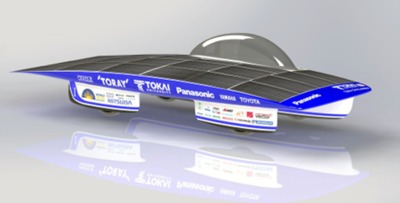Panasonic's solar cells to support Tokai Uni solar car team
Panasonic will provide technological support to the Tokai University Solar Car Team as it competes in the World Solar Challenge (WSR), held in Australia from 6 to 13 October 2013. The company will be supplying high-efficiency HIT solar cells with high electricity output and high-capacity lithium-ion batteries.
These solar cells are said to have a unique hybrid configuration with a crystalline silicon wafer substrate surrounded by ultrathin amorphous silicon layers. Compared to ordinary crystalline silicon solar cells, these cells are claimed to suffer less degradation of power output at high temperatures, delivering the industry’s highest-level energy output per unit of area (in terms of area per m2 and system capacity (per kW) in Japan’s domestic industry for solar power generating systems for residential use, as of June 2013, according to Panasonic data).
This makes Panasonic’s HIT solar cells suitable for solar cars competing in races such as the WSC, given that the WSC regulations limit the total area of solar cells installed on the body to up to six square metres, and that the cells will be exposed to the scorching Australian sun. The HIT solar modules for the Tokai University team are purpose-built for the solar car race, using the same solar cells - the main component that converts the sunlight into electricity - that are mass-produced for the residential market.

The rechargeable batteries Panasonic is providing are the cylindrical 18650 type (18 mm in diameter x 65 mm in height) high-capacity lithium-ion battery cells which use the company’s proprietary nickel-based positive electrode. The high-capacity and lightweight battery cells store excess power generated by the HIT solar cells so that the car is able to continue running even on overcast days.
Steve Rust, managing director, Panasonic Australia, said, “I’m proud Panasonic is able to support Tokai University in its WSC bid. Globally, Panasonic is focused on a range of sustainable activities - from recycling to marketing a range of energy-efficient home appliances, and is developing further technologies and services that aim to reduce household CO2 emissions such as home energy management systems.”
WSR is a time-based competition over a distance of 3021 km from Darwin in the north down to Adelaide in the south. Teams from around the world, including universities and corporations, participate in the race in cars powered solely by sunlight.
The Tokai University won the previous WSC races held in 2009 and 2011. Last year, the team also won the race in South Africa that was recognised by the Fédération Internationale de I’Automobile (FIA) as the world’s longest alternative fuel vehicle car race. Panasonic’s energy products contributed to the team’s victories at these international competitions.
Corn protein boosts lithium-sulfur battery performance
Researchers have demonstrated how corn protein can enhance the performance of lithium-sulfur...
Computational model enhances battery safety
Researchers have developed a new computational model that offers insights into one of the key...
Novel method to extend lifecycle of Li-ion batteries
Researchers have uncovered a hidden surface degradation mechanism in the cathodes of lithium-ion...




